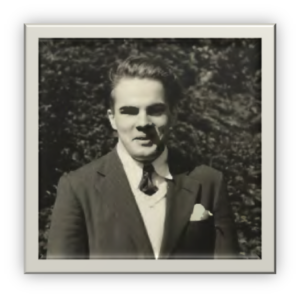John Jensen was almost entirely blind from age three and attended a specialized school, New York Institute for the Education of the Blind (NYIEB). This was a residential school in the Bronx. It is still operating, but not exclusively for the blind. “Johnny” entered first grade just after his eighth birthday and graduated high school at age twenty. This kind of lag, though not typical at the school, was not terribly uncommon. The school reports serving students as old as age 21.
“The Institute,” as it was familiarly called, was rich in courageous kids who would travel about New York City without canes, guide dogs, or even outstretched arms. Though John Jensen was spoiled and dysfunctional when he entered the institute, he matured into a very independent student. His buddy Fred Tarrant, who attended the Institute because he was too blind to read (though in his youth could see enough to ride a bike), reports that this was not merely common; it was enforced. Fred tells me that students at the Institute were shamed out of using canes. As if that weren’t severe enough, students who walked around with their arms flailing before them were reviled as “gropers.” Treatment like this, though arguably abusive, was perhaps not ineffective for those like John Jensen who were so proud as to make pride seem, well, like a mortal sin. This was one school for the “special” that didn’t baby its students.
Academically, John was an average student. He started with mostly C’s, getting a lone D in “language” in first grade. He continued to receive C’s in second grade. He began to show progress in fourth grade, receiving B’s in language, reading, arithmetic, and geography. He managed to earn a D in violin, but who can fault him for that? In fifth grade he got a D in geography (now that’s unforgivable), but he continued to show modest improvement. In eighth grade he got four A’s and only one C.
John hovered around a B average throughout high school. At the extremes, he earned steady A’s in history but did badly in chemistry, barely avoiding a D, bombing his chemistry regents exam (with a 36) and just surviving the make-up exam in his senior year. He was hit and miss in algebra, managing an A and a 96 on the regents in his sophomore year, but then dropping to a low C in his junior year. The best grade he received at the Institute was a 96 in massage (in his senior year). Having got a 118 on “the IQ Test,” John was capable, but perhaps not the most consistent or disciplined student. Though he expressed interest in college, the Institute was not optimistic about his chances. They did not even like his prospects as a physical therapist:
John’s original vocational plan was to train for a masseur but after investigation we have found physical therapy and massage to be impractical due to the fact that licenses are not issued to the blind in New York State. There may be openings in this profession in other states but it is doubtful that it would be wise for John to leave New York. It is the opinion of those who have counselled with him that he might possibly learn to be a dictaphone operator. For John’s type it would seem that factory work should be a last resort. John, himself, has the idea that he would like to go to college although there is in the minds of many of those who have worked with him a definite reservation as to the wisdom of college training for him.